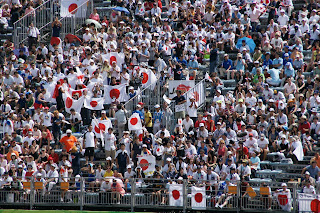
I've been given the honor of writing our last post of 2008 and have been thinking a lot of what to say and finding am image that best says it. Going through our large photo archive, I've found this shot, from the Paralympics Opening Ceremony and feel its the best choice (though our photo is pretty crappy, its the idea behind it).
More than any moment during the Olympics, it was this moment, Hou Bin pulling himself up to the roof of the Bird's Nest while sitting in his wheelchair, that for my money was the greatest athletic feat of 2008. It offers both the necessary pride and hope that was (and is) needed as 2008 comes to an end and we enter 2009.
Look at how China pulled itself up and prepared for the Olympics, hosting one of the greatest ever Summer Games. Look to the people of Sichuan as they try to pull themselves up from the ruble of the massive quake that struck on 5/12. As you face the current economic crisis, be brave and know that no matter what, you can always pull yourself up from it.
Pull yourself up. Hou Bin did it, we can all do it too. Look back at all the joy that 2008 brought, honor those who left us during the year, and plan on how we can all work to make 2009 an even better year.
My colleagues here aren't known for their optimism and are far more cynical (probably why I was chosen for this?), but a new year means a new start and is the time optimism is required. Look at that picture (or watch the video) and remember, you can do it, pull yourself up!



































